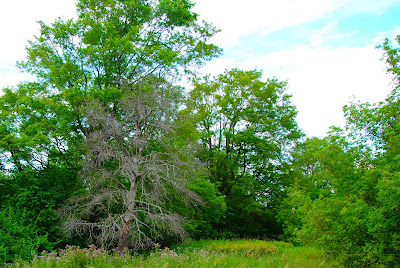A few entries ago, I wrote briefly about reading Mary Oliver’s Winter Hours. I would love to type out an entire poem here, but without having permission to reproduce it in full, will give you a link instead (and do read it in full), and quote the final four lines of what is probably her most well-known poem: The Summer Day.
She is writing about prayer. She says she does not know what a prayer is, but she does know how to pay attention: “how to be idle and blessed.” She has spent the day in what might appear to be idleness, strolling through fields, kneeling in the grass, examining the grasshopper. She asks:
Tell me, what else should I have done?
Doesn’t everyone die at last, and too soon?
Tell me, what is it you plan to do
with your one wild and precious life?
Yesterday started with unexpected news from my mother’s family: the sudden death of one of my cousins’s spouses, mother of two, only 43. They live in another country, and I can’t say we’ve seen them more than every other year or so. But the day was nevertheless altered by the knowledge of this family, not far removed from my own, suffering an unimaginable shock and loss. What comfort can there be for her boys? Her youngest son is the age of my eldest. There was no preparation, no advance knowledge, just in an instant, one precious life gone. She is no longer in this world with her family.
What waits around the corner? What secret end is hidden inside the body, waiting to reveal itself in time? Nobody knows.
And so, Mary Oliver’s wise and bright words came again to me. No wonder they are quoted so widely. No wonder. Because, yes, everyone dies at last and too soon. And we are all alive, right now. If you are reading this, you are alive. Life is wild. It can’t be tamed, or made safe. It’s all any of us has really got. What are we to do with it? What a question.
Here’s what I did yesterday: hung laundry on the line, made yogurt, smelled my children’s hair, jumped on a trampoline, ran through the woods, cheered from the sidelines of a soccer game, drifted, fought impatience, struggled with my children arguing with each other, and wondered … what more? Or even, what less? What do I plan to do with this one precious life?


Oh Carrie, I’m so sorry for your loss. I’m glad you’ve been able to find words that are a comfort. Sometimes that’s all we can do.
Two years ago, good friends were faced with a tragedy that was unimaginable. It has changed how I live, how I see life, less so on the outside, I’m not sure an outsider could see differences, but I can feel them.
My thoughts are with you and your family.
Not that poetry has to be a balm, not that it has to have to purpose to have meaning, but yes, when it does, it just feels so right and necessary.
Thanks for your comment, M. I think I understand what you mean about being changed on the inside by loss. It’s something I’m trying to get at in this book I’m writing. I’m so sorry for your friends’s loss (which was yours, too).
The unimaginable. What can we do with it?
oops: “not that it has to have *that* purpose …”
I think we do our best to simply survive the unimaginable. Day by day, get through it, and then later when the loss is not so raw, we honour the loss through action. Either something small like literally stopping to smell roses on the way to the park, or doing something in memory of the people we’ve lost. Maybe something that they never had the chance to do, or something that they once loved, or simply something that we love because we are lucky to be alive.
It’s interesting that you’re writing about the change through loss in your book. Most of the poetry I’ve been writing lately has been exploring that, too. It’s hard and huge, yet feels vital.
Thank you for this, M. I look forward to reading your poems.
M, I just wanted to tell you that your reflection on what to do with the unimaginable has really stayed in my mind. Thank you for responding further, and going deeper. What you say about loss, and how to answer it, just rings so true. I’m not really expressing myself well here, but I wanted to tell you that your words are “sticky,” and I mean that in a good way! I like when an idea sticks. And when it offers hope, too.
Sorry to hear about your loss. I find that people leave footprints on our hearts and whether they leave a few or many, the impact on our life lingers. When a person is gone, those prints are still felt. I hope those prints you have and that your cousin and his children have from his wife will create wonderful memories for you all to share in the years to come!
Thank you, Christyn.